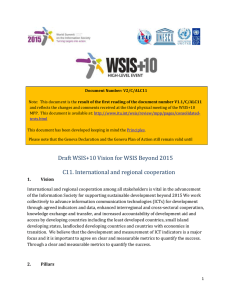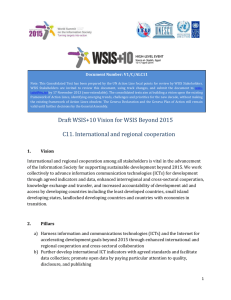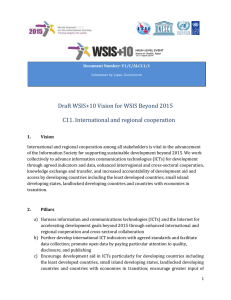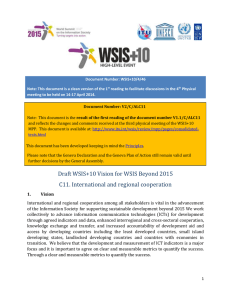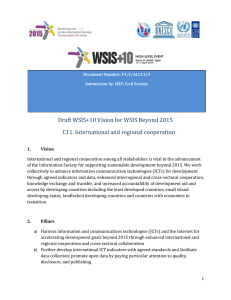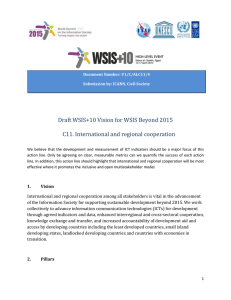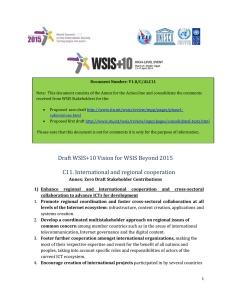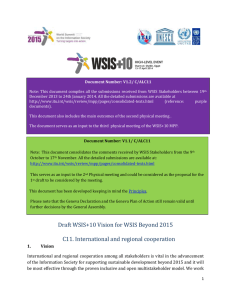Draft WSIS+10 Vision for WSIS Beyond 2015
advertisement
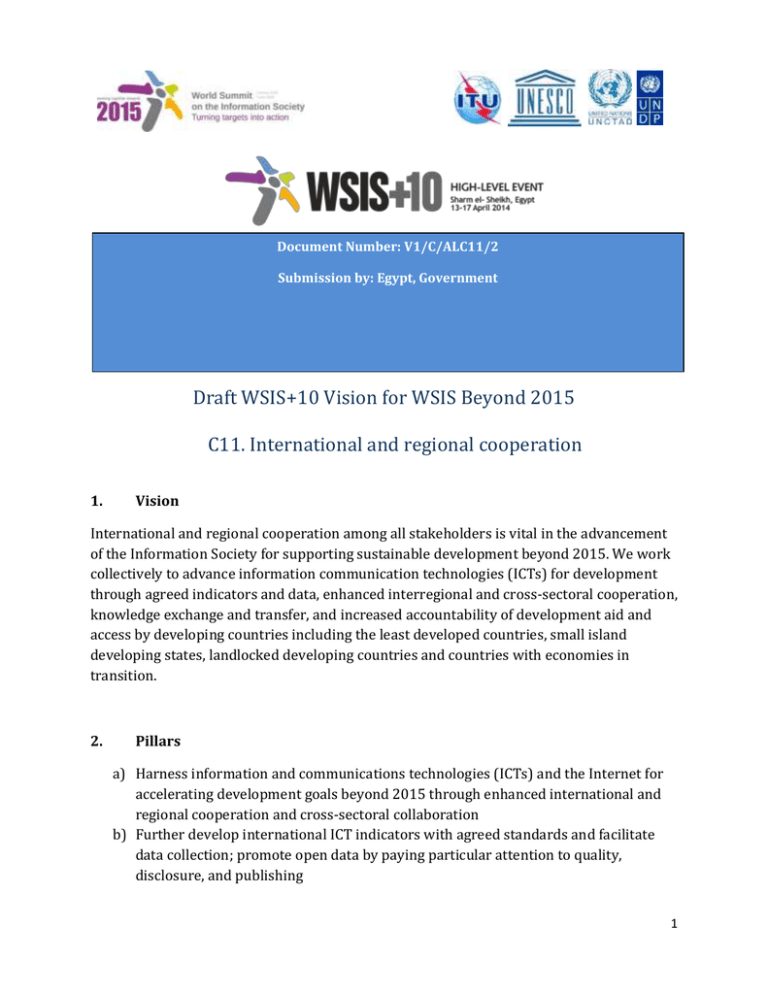
Document Number: V1/C/ALC11/2 Submission by: Egypt, Government Draft WSIS+10 Vision for WSIS Beyond 2015 С11. International and regional cooperation 1. Vision International and regional cooperation among all stakeholders is vital in the advancement of the Information Society for supporting sustainable development beyond 2015. We work collectively to advance information communication technologies (ICTs) for development through agreed indicators and data, enhanced interregional and cross-sectoral cooperation, knowledge exchange and transfer, and increased accountability of development aid and access by developing countries including the least developed countries, small island developing states, landlocked developing countries and countries with economies in transition. 2. Pillars a) Harness information and communications technologies (ICTs) and the Internet for accelerating development goals beyond 2015 through enhanced international and regional cooperation and cross-sectoral collaboration b) Further develop international ICT indicators with agreed standards and facilitate data collection; promote open data by paying particular attention to quality, disclosure, and publishing 1 c) Encourage development aid in ICTs particularly for developing countries including the least developed countries, small island developing states, landlocked developing countries and countries with economies in transition; encourage greater input of developing countries on the deployment of funds for enhanced ownership and accountability d) Facilitate knowledge sharing and exchange among experts and stakeholders e) Further promote the inclusive and open multistakeholder model 3. Targets a) To collect 100% of ICT related data with agreed indicators and standards 2 Annex: Zero Draft Stakeholder Contributions 1) Enhance regional and international cooperation and cross-sectoral collaboration to advance ICTs for development 1. Promote regional coordination and foster cross-sectoral collaboration at all levels of the Internet ecosystem: infrastructurecontent creation, applications and systems creation. 2. Develop a coordinated multistakeholder approach on regional issues of common concern among member countries such as in the areas of international telecommunication, Internet governance and the digital content. 3. Foster further cooperation amongst international organisations, making the most of their respective expertise and remit for the benefit of all nations and peoples, taking into account specific roles and responsibilities of actors of the current ICT ecosystem. 4. Encourage creation of international projects participated in by several countries 5. Encourage organization of regional and international conferences focusing on ICTs, to facilitate the creation of multi-stakeholder cooperative initiatives to address shared problems such as tackling cyber security and also ensure that Internet-related public policymaking keeps pace with innovation and rapid technology change. 6. Strengthen the cooperation between different ICT stakeholders in the region and among national, regional and international institutions to boost the transformation of the society using ICT. 7. Encourage Governments to take more bold steps to advance cooperation between the countries in the ICT4D field. 8. Foster cooperation in cyber security including in the areas of data privacy and protection in global context 9. Advance international and regional cooperation to harness ICTs for accelerating the progress on Millennium Development Goals (MDGs) and beyond 2015, and to improve the lives of all, particularly the most vulnerable 10. Encourage all stakeholders to work together to ensure an open internet, the free flow of data and the avoidance of trade protectionism, as an increasing portion of world commerce is conducted on the internet and/or is dependent on the free flow of data and an open internet. 11. Encourage enhanced co-operation on intra- and inter-regional level between both public authorities and private entities 12. Increase awareness and build capacity on existing cooperation mechanisms in order to make them easier to understand and engage with. 3 13. Promote establishment of regional e-government Councils composed of heads of e-government programs in order to provide a platform for cooperation and exchange of know-how and expertise. 14. Develop a cross-border Internet Exchange Points (IXP) to foster regional integration of IXPs and service the region with a view to help lower the cost of internet traffic. 15. Encourage regional collaboration on the Peaceful Use of Outer Space 2) Development and measurement of ICT indicators 16. Step up the use of internationally agreed ICT indicators. 17. Foster international cooperation in the area of ICT measurement to avoid duplication of efforts and maximize the usage of resources. 18. Encourage collection as well as responsible and ethical use of real Internet data to guide policy makers and decision makers. 19. Promote programmes and projects focusing on ICT indicators 20. Encouraged countries to fill add and update their entries in the WSIS Stocktaking to reflect the progress made in building the information society, as the knowledge and experiences of stakeholders from developing countries will enhance future outputs from the multistakeholder organizations, adding to the know-how of the international community. 21. Foster development of regional and international strategies improving access to and use of ICT in developing countries, enabling environment, facilitating measurement of ICTs for development with focus on e-government indicators worldwide. 22. Addressing developmental requirements with respect to the DNS sector, foster development and implementation of regional strategies, especially in Africa, the Middle East and Latin America. 23. Enhance the cooperation on the related programs on the utilization of ICT tools for enabling gender equality, and addressing inequalities particularly of disable and indigenous groups. 24. Define international standards for releasing public data sets in open formats by paying particular attention to quality, disclosure, and publishing 25. Foster creation of ICT-based services using mobile communications services. 3) Development aid in ICTs particularly for developing countries including the least developed countries, small island developing states, landlocked developing countries and countries with economies in transition; greater input of developing countries on the deployment of funds for enhanced accountability and ownership 4 26. Foster implementation of international projects on ICT and bridge digital divide, including those financed within the framework of the Official Development Assistance. 27. Attract the attention of regional funds to indulge into funding ICT-related projects and initiatives, especially those of regional nature, on the grounds that ICT is a key player in generating growth and providing youth with employment opportunities. 28. Foster development of regional and international strategies improving access to and use of ICT in developing countries 29. Ensure that all developing countries receiving ODA funds have greater input on how the funds are deployed, thereby giving them greater ownership and encouraging their demand for accountability 30. Encourage engagement of developing countries in the implementation of the WSIS outcomes 4) Knowledge sharing and exchange among experts and stakeholders 31. Foster the exchange of experiences and good practices between the various stakeholders and expert groups (including the collaboration platform, intra-and inter-regional conferences, seminars, trainings, twinning, exchanges of experts, study visits) 32. Ensure increased focus on supporting the engagement of developing countries in the multistakeholder organizations, and in national and regional forums, so that developing countries can benefit from the expertise and best-practice of the multistakeholder organizations. 5) Promotion of the inclusive and open multistakeholder model 33. Further promote the inclusive and open multistakeholder model that has evolved where governments, industry, civil society, the technical community and academia interact on an equal footing. 5
